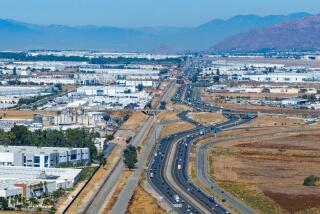Pico Rivera Sheds Stereotypes to Lure Retail Developers
PICO RIVERA — City Manager Dennis Courtemarche remembers the days when prospective developers would turn their noses up at Pico Rivera, saying things like, “We’re not going to go there because it’s 80% Hispanic and Hispanics don’t buy expensive hamburgers.”
“We have been fighting that image problem for a long time,” Courtemarche said.
But the success of the city’s first shopping center, Pico Rivera Plaza, completed in 1980, has resulted in developers discarding their stereotypes and building in this city of 57,000. City officials say developer interest has been strong in a planned shopping corridor along the south side of Whittier Boulevard from the city’s eastern boundary to Rosemead Avenue.
Space Is 90% Leased
Construction is under way on the 250,000-square-foot Crossroads Plaza across Paramount Boulevard from Pico Rivera Plaza, and the new center is 90% leased, Courtemarche said. On the next corner, a Standard Brands paint store is planned and the city is negotiating for two strip shopping centers to extend east along Whittier Boulevard.
For Courtemarche, the fenced-off empty lots are preferable to the mismatched collection of residences and businesses the city has been determined to replace since the Redevelopment Agency was formed in 1974.
“This was all junk,” Courtemarche said during a drive through the area last week. “It took about a year to get it all demolished.”
In order to attract businesses to the area, Courtemarche said Pico Rivera had to drop any pretensions of “being Beverly Hills or Newport Beach.” Instead, the city sought less exclusive businesses, such as Montgomery Ward and Alpha Beta for Pico Rivera Plaza, and got Home Depot and Albertson’s to anchor the 18.5-acre Crossroads Plaza.
“I think we would have liked to have seen a traditional soft goods store in our shopping center, but the market just wasn’t there,” he said.
“We were able to capture some of the tenants other cities would like to have because we were realistic. We never set unrealistic goals. We didn’t feel we had that choice.”
Favorable Demographics
The explanation for developer interest in Pico Rivera is demographics, Courtemarche said.
“What has sold us is our median income in the mid-$20,000 (range) and high population density within a five-square-mile area,” he said.
But what has also helped sell the area is the Redevelopment Agency’s willingness to provide large subsidies in the form of discounted land and public improvements.
The agency has subsidized Crossroads Plaza for more than $7 million, in addition to hundreds of thousands of dollars in property settlements to businesses and families displaced by the project.
The city also is paying for millions in street and utility improvements that are crucial to developers, said David Caretto, assistant city manager. “They’re anxious to have Whittier Boulevard improved,” he said, adding that some retailers have been reluctant to invest because “they have some difficulty visualizing what the street will look like.”
The public works improvements are at least six months behind schedule, Caretto said, with completion now targeted for next summer.
Since 1974, the agency also has poured $36 million into the Whittier Boulevard redevelopment and used its power of eminent domain to acquire property occupied by about 75 businesses and 160 families. The city had to condemn 40 land parcels and lawsuits are pending in 12 cases over financial settlements, Caretto said.
The payoff of redevelopment, officials say, comes in hundreds of new jobs in retail service, sales tax revenue and increased property values.
Due largely to redevelopment, Pico Rivera’s annual sales tax revenue has doubled to $4 million since 1982 and is expected to top $5 million by 1990, Courtemarche said. Sales tax revenue makes up about 45% of the city’s general fund.
Local merchants collect 6 1/2 cents in sales tax on every dollar they receive, and the state returns one cent to city government.
Since redevelopment began, Courtemarche said the average commercial rent in Pico Rivera has increased from about 50 cents per square foot to about $1.50. Commercial property that sold for $5 per square foot in 1983 is now selling for up to $15, he said.
But prospects are uncertain for another cherished project: an upscale hotel on the southeast corner of Washington and Rosemead boulevards. A developer’s plans for a $24.5-million hotel and shopping area fell through last year and officials have yet to confirm plans for the 7.85-acre site.
More to Read
Sign up for Essential California
The most important California stories and recommendations in your inbox every morning.
You may occasionally receive promotional content from the Los Angeles Times.










